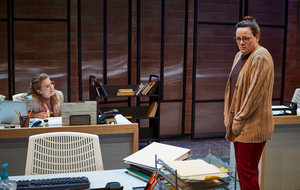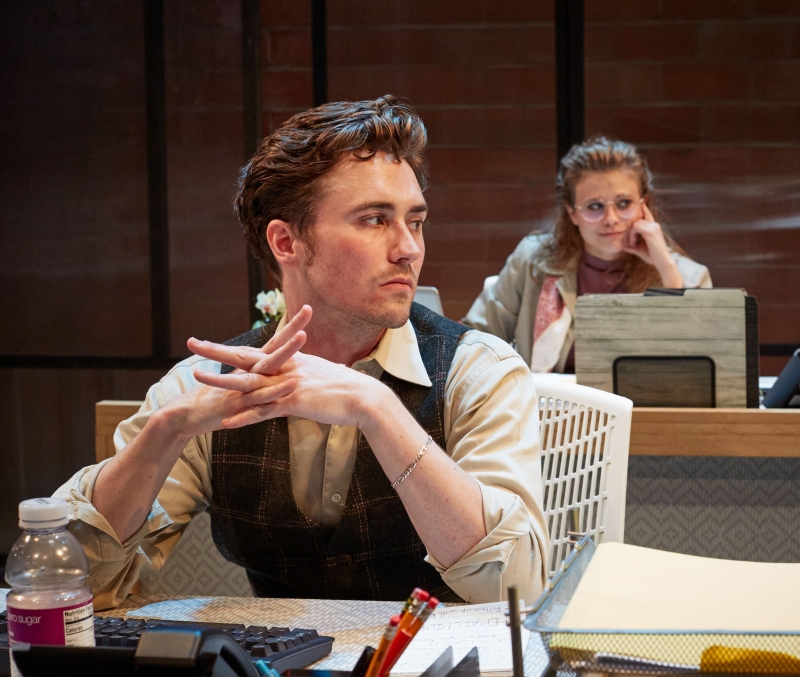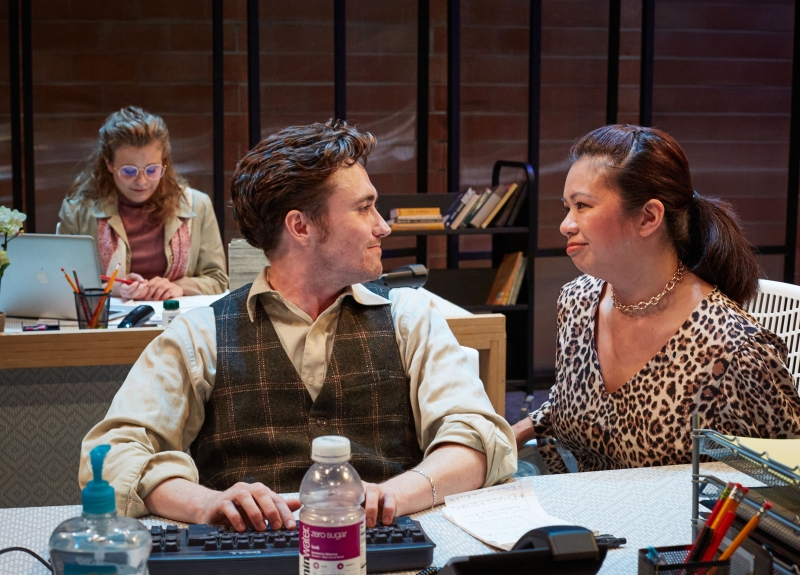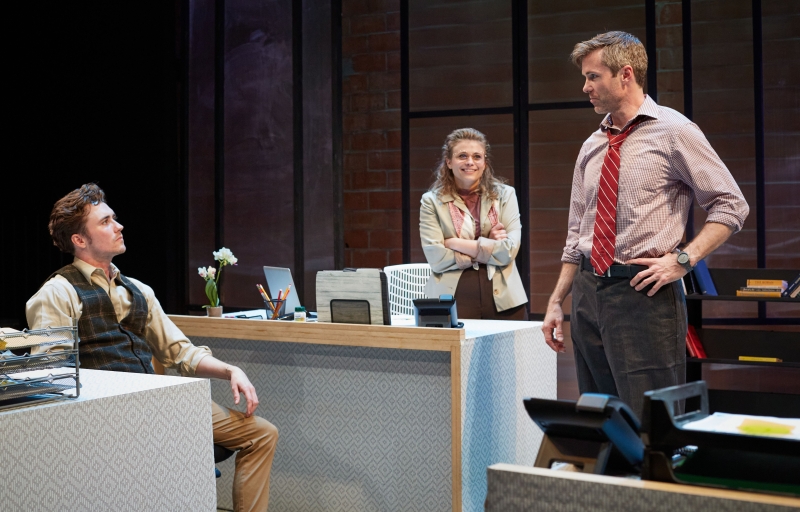Review: GLORIA at 4th Wall Theatre Company Presents a Smart and Seething Take on Violence in the Digital Age
This play contains themes of gun violence, mental illness, and suicide. This review discusses these themes. For more information, contact info@4thwalltheatreco.com

NOTICE: This review reveals surprising elements of the plot of the play. Spoilers ahead.
What a gut punch of a play is Branden Jacobs-Jenkins's Gloria, and what a tight and well-paced rendition 4th Wall Theatre Company has offered. The subject matter of Jacobs-Jenkins's play could easily have been a disaster, and the flippant attitude that the characters frequently adopt leads the audience to believe that it might be. But the script maintains a remarkable self-awareness that manages to stay ahead of the audience's assumptions and even subvert them. All of this is tapped into to great effect by director James Black, along with a talented cast of actors.
Where to begin detailing the plot of Gloria? Where the play itself begins bears merely a passing resemblance to the place it ends. One might as well start with Gloria herself. Gloria works at a magazine. She has worked there for years, seen editors and assistants come and go, and yet she has no friends. She is the office weirdo. The night before our play begins, she has thrown a party to which almost no one has come. It is a sad existence she leads.

Photography: Gabriella Nissen
But wait. Perhaps we shouldn't begin with Gloria. After all, she is only onstage for all of two minutes (though Brooke Wilson makes the absolute most out of those two minutes). Perhaps we should rather start with Dean (Wesley Whitson)-AKA the only person who went to Gloria's party, a shame for which he is viciously ridiculed by his co-workers, Anica (Skyler Sinclair) and Kendra (Karina Pal Montaño-Bowers). We are introduced to this group as the assistants to the editors of the magazine where Gloria works. With relatively few responsibilities, they spend most of their work day gossiping about their colleagues and venting about how toxic the publishing industry has become. Most of the first act is taken up by this chit-chat, with only occasional references to Gloria's disastrous house party, an event the characters seem all too happy to forget.
A relatively innocuous stream of workplace chatter, the first act could easily buckle under the weight of its own inertia. But the actors keep things chugging along nicely, giving us just enough humor and personality to keep us interested in their characters' lives while we wait for Jacobs-Jenkins to reveal what the point of it all is. A lot of that relies on the comedic timing, which the actors have in spades.
We do get occasional peeks at what might be coming (although we don't know it at the time), as Gloria pops in sporadically just to see if everyone is at their desks (props to Brooke Wilson, who conveys Gloria's reclusive self-consciousness so believably that it made me want to turn back time so I could go to her party). These moments are only mildly unnerving, and actually engendered sympathy for Gloria in me. After all, who among us can't relate to such awkward encounters? (Hold on to that idea.)

Pal Montaño-Bowers
Photography: Gabriella Nissen
It also helps that the characters are compelling and the actors have strong chemistry. Wesley Whitson plays Dean with compelling exasperation; this is a man who has given just about all he's got to give to his dead-end job and is ready for something (anything) else. He spars well with Karina Pal Montaño-Bowers as Kendra, the office mean girl who cannot be bothered to come in on time. Montaño-Bowers plays her with the unearned cockiness of someone who is only vaguely aware of the fact that her coworkers don't really care what she has to say. Anica balances out this trio as the only chipper one in the office; she is university-educated, learned in science and math, yet chooses to work in print media (to the utter bewilderment of her far more jaded coworkers). Sitting quietly behind them for most of the first act is Miles (Tadrian White), the mild-mannered intern who has seemingly no interest in journalism.
Fact checker Lorin (Brandon Hearnsberger) gives us an idea of what the rest of the office thinks of these four by periodically marching in to inform them that they are being too loud. Though Lorin is clearly working with some frayed nerves and thinning patience, his pleas mostly go unheeded by these gossipmongers. Lorin seemingly reaches a boiling point toward the end of the act when one of them reveals that, due to Kendra's interference, an article that he is being forced to rush into print is likely going to be rewritten. It is at this moment that we most clearly see the negative impact that this industry has on its employees. Lorin's nervous breakdown-initially entertaining-quickly gives way to the real life implications of working in such an inhumane environment. We begin to see that underneath their hardened and sarcastic exteriors, something inside of these characters is being slowly whittled away.
This tension, which simmers under the surface for most of Act One, blows up in dramatic fashion at the end of the act. Having had enough of popping in to see if the assistants are all assembled yet, Gloria walks out with a gun and begins striking down her co-workers. The only one she spares is Dean, who has apparently earned her favor by being one of the only people to attend her party the night before. After thanking Dean for always being so kind to her, Gloria turns the gun on herself as the lights black out.

Photography: Gabriella Nissen
Now. If you are unfamiliar with the plot of Gloria, you might be feeling a bit apprehensive at this point. I certainly was. I had been enjoying a sharp, charming, sardonic workplace comedy, and now half the characters were dead. What made it worse was that I was very nervous that the play had fallen into the familiar (and problematic) trap of "Socially Awkward = Mentally Unstable = Mass Murderer." The implications are numerous, and very few of them are good. Fear not. Jacobs-Jenkins handles this sensitive material with thoughtfulness and self-awareness, never fully acquitting or condemning Gloria. The trick to doing so is that he does not allow only one character the space to speak on her actions.
Act Two begins with a now severely traumatized Dean meeting up with Kendra (who was at Starbucks at the time of the shooting) to talk about the events. Both express feeling "Gloria fatigue" due to the constant media coverage of the event. "Why give her the attention?" Kendra asks, and it is a valid question. Framed as the sole survivor of the attack, Dean has been put through relentless interviews and even had to be hospitalized following a nervous breakdown. It would certainly seem that Gloria has taken her toll on both of them.
However, we quickly learn that neither she nor Dean are actually that fatigued-in fact, both have started writing books about the incident. The real reason Dean has invited Kendra to get coffee is so that he can make sure she doesn't plan on defaming him in her book.
Here, Jacobs-Jenkins shows us what happens when psyche-shattering trauma collides with the parasitic desire for fame. On one level, Dean and Kendra want to forget that Gloria ever happened. On the other hand, she may just be the most influential thing that ever happened to them. Maybe if they can turn their trauma into something, make it generative, then they tell themselves that some good came of it. Maybe if they can reframe the narrative, they can reclaim some control over it. Or maybe the toxic, exploitative environment they inhabited during Act One has simply robbed them of their ability to sit with their emotions, so they are processing them the only way they know how. Either way, it begs the question: has Gloria actually broken them, or were they already broken when she found them?
The show leans further into the latter when we run into Nan, Dean's former boss at the magazine (Wilson doubles as Nan and Gloria). Now very pregnant, Nan shares a moving story about how she discovered her pregnancy while hiding under her desk from Gloria. After years of compromises and good-enoughs that led her to a soul crushing job in editing, this unimaginable act of violence finally woke her up to the things in her life that mattered and gave her the courage to pursue her dreams...or so she tells us. Maybe it's all true, but it becomes harder to swallow when she immediately shows interest in writing her own book (Wilson punctuates the line perfectly with a greedy "How much do you think I could get for it?")
At this point, one begins to wonder how much Gloria actually matters to this play. Obviously she is the catalyst for these events, and the way in which she chooses to take out her dissatisfaction with her life has disastrous consequences. But is this really a play that grapples with the difficulties of undergoing a traumatic event, or is it about the blood-sucking nature of contemporary media culture? I would posit that it is about both. Furthermore, it is about how inseparable those two things have become. After all, how are we to process our trauma if we are not given the space or resources to do so?
But alas, we cannot ignore Gloria altogether. The third and final part of the play brings this fact into sharp clarity by checking in with Lorin, who is now doing temp work while he studies for the LSATs (having wisely chosen to get out of the publishing industry). However, he winds up temping for the film company that is auctioning the rights for Nan's book.
Seemingly the only person to have gotten away from the tragedy unscathed, Lorin questions whether there is a need to make a film (or anything else) out of Gloria's actions. Although his new bosses are ravenous when they hear that he was present for the shooting, he seems disinterested in dissecting the event. He is particularly resistant when they ask him to describe Gloria: "She was...normal," he tells them. They are clearly expecting something different, but Lorin presses on, dispelling the notion that Gloria was a monster who was always destined to become a murderer.

Hearnsberger
Photography: Gabriella Nissen
Lorin sees the shooting for what it was: Gloria's breaking point. He does not forgive her actions, but neither will he allow them to demonize her by painting her as intrinsically broken. It's a delicate balancing act, and you can see Lorin trying to find the words to explain. I couldn't help but feel that the way he chose to explain Gloria would make or break this play. How much sympathy can we give to someone who committed such an unconscionable act? But when have we gone too far in the opposite direction? At what point does condemning Gloria take attention away from the societal pressures that made her snap? Are we perhaps directing our criticism in the wrong direction entirely?
Gloria is not a play that has only one thing to say, because it recognizes that with a tragedy such as the one depicted, there is never only one viewpoint to consider. Miraculously, Jacobs-Jenkins finds room to humanize Gloria while also giving voice to the victims of her breakdown. Kendra and Dean are not obligated to sympathize with Gloria. They are too wrapped up in their own trauma, and they have every right to be. But Lorin, as someone who was not directly injured by Gloria's actions, has the emotional capacity to offer her some humanity. That humanity even leads him to reflect on his role in the tragedy and how he might improve going forward.
As I said before, the play is a thematic balancing act, but luckily this production is bolstered by a cast that is very sensitive to the needs of the script. The actors seem perfectly tuned into the tonal and rhythmic demands of the plot, conveying a multitude of tonal hard lefts without letting the audience get ahead of the reveals. Many of the actors also deserve praise for the skill with which they differentiate the different characters they play. Skyler Sinclair is particularly versatile, altering her physicality in productive ways to convey how each of her characters occupies space.
In addition, while Whitson only plays two characters, he may as well play three, as the Dean that we meet in Act One is functionally unrecognizable in Act Two. Shaken to his core and unable to process his trauma, Dean has been reduced to a trembling ball of anxieties. He shakes, fidgets, and twitches with the restlessness of someone who has been robbed of the ability to feel safe.
And of course I would be remiss not to mention Wilson, who transforms seamlessly from Gloria (barely holding it together) into Nan (the picture of composed competence).
The rest of the cast oscillates admirably between real people in the throes of human emotion and consumerist vampires who can only view emotion as content to be devoured. The staging is kinetic where it needs to be, keeping us engaged even when the characters are just sitting at desks and coffee tables. I do worry, however, about the people sitting in either of the side sections. I sat in the center, and all of the scenes seemed to be blocked for that section. Those sitting in the stage left seats may find themselves staring at the back of Nan's head for the entirety of her monologue.
Design-wise, everything more or less works. Costume designer Paige A. Willson does a great job of matching the characters' personalities to their costumes, and at times even using them to enhance characterization. I also have to give props to sound designer Jon Harvey for including the obligatory song that features the name of our show's titular character.
Branden Jacobs-Jenkins's play is both about Gloria and it is not. That is, it is more about Gloria as an event than as a person. It wrestles with what happens when the event gets conflated with the person. But it also deals with how the event gets remembered and how it lodges itself in our collective memories. It is a rich and intelligent play that is even more impactful in an age when we are all too quick to try and simplify issues that cannot and should not be simplified.
Gloria (the event) was not about just one thing. It was one woman's decision to hurt others, but it was also a culmination of years of isolation, exacerbated by a toxic professional environment and a mass culture that increasingly privileges extreme individualism to the detriment of our ability to empathize with others. If we are to talk about issues like this, we absolutely must be willing and able to look at it from all sides, and we must understand that empathy for the perpetrator does not have to come at the cost of the victims. We must also challenge the consumerist culture that keeps us so emotionally stunted that we have no choice but to sensationalize our trauma. Ultimately, the play asks what we lose when we are slowly leeched of our humanity.
Gloria is running from March 25 to April 16 at 4th Wall Theatre Company. Tickets start at $17 and can be purchased at https://ci.ovationtix.com/35941/production/1052142 or by calling (832) 767-4991. A closed captioned performance will be held on April 3, with talkback following. A Pay-What-You-Can Night will also be held on April 11. This show does contain sensitive material, so contact the box office or email info@4thwalltheatreco.com with any additional questions.
Reader Reviews

Videos

